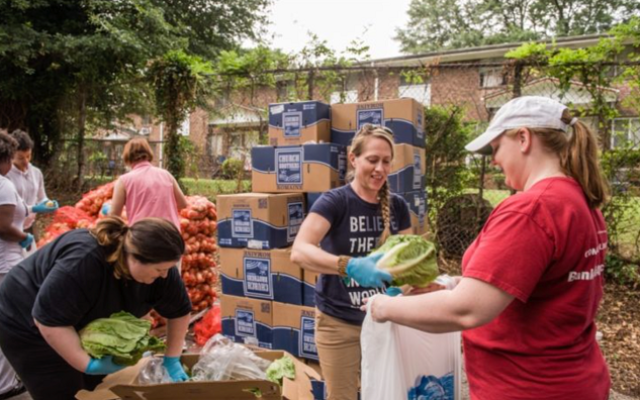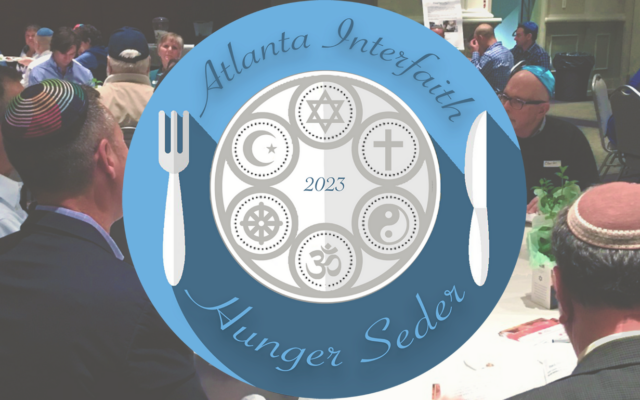Hunger Seder Spotlights Food Insecurity
JCRS’s Passover Seder on April 10 focuses on the need for food assistance after the pandemic.
This year’s Interfaith Hunger Seder, scheduled during the intermediate day of Passover on April 10, comes at a critical time for food programs. The event, which has been held annually for the last 12 years, is a project of Atlanta Jewish Community Relations Council to raise awareness about the issues of hunger, both in America and in the local community. The fundraising goal for the Passover program is $10,000.
Among the 20 co-sponsors of the program are four local synagogues, the Northside United Methodist Church, the Ahmadiyya Muslim community, and the Interfaith Atlanta organization. The president of the Community Relations Council, Harold Kirtz, says the group takes literally the injunction from the Mishnah of Pesachim, which is found in the traditional Hagaddah, “ha lachma anyah,” or, “all who are hungry come and eat.”

“It’s a very serious issue. Food insecurity affects one in nine people in Georgia,” Kirtz says. “We try to create advocacy opportunities to improve the food security situation and we always advocate for ensuring that the food stamp program, now called SNAP, is funded as much as possible.”
SNAP, which stands for the Supplemental Nutrition Assistance Program, serves those with low income and is administered by the federal Department of Agriculture. There are more than 41 million Americans receiving SNAP benefits.
In Georgia, that includes over 1.6 million residents, or 15 percent of the state’s total population. But, with the end of a program begun three years ago at the start of the COVID pandemic, food benefits have dropped precipitously. Georgia ended the extra food help in May 2022, but it ended everywhere in America this month.

The average household that receives around $200 in SNAP benefits lost the extra $95 in pandemic-related help. Some older recipients have seen the steepest decline. There, according to the Center on Budget and Policy Priorities, food help has decreased from $280 a month to $23 every 30 days. The sudden end to extra benefits, this March, combined with a sharp rise in food prices and other inflationary increases, has meant tougher times for many food aid recipients. It’s led to what Ellen Vollinger, who helps direct the non-profit Food Research and Action Center, calls a “hunger cliff.”
“The cliff is aptly named because this is a very abrupt change in what people are going to have in their food budget and, nationally, it’s affecting tens of millions of people.”
Among the 16 partner organizations that are participating in the Hunger Seder is Atlanta’s Jewish Family & Career Services, which maintains a food pantry as well as the only kosher food bank in the Southeast. During the pandemic, the social service agency ramped up emergency financial assistance for many of the necessities of life, including hundreds of thousands of pounds of food.

While many areas of the services JF&CS has offered have been done virtually, food, according to their director of development, Jessica Yonatan, has been a very personal program.
“Our food pantry has just grown tremendously, and food is not virtual. That was all in person. We had…donors dropping off food to donate to the food pantry. We had volunteers shopping for us. We had volunteers dropping food off at people’s homes so they could eat and not worry about where their next meal was.”
Yet another important partner in the Hunger Seder is the Atlanta Community Food Bank, which has seen strong and steady growth over the last decade. Last year, it distributed what it described as 79.3 million meals and grocery products through a network of nearly 700 community-based partner organizations.
For over 30 years, the Food Bank has collected non-perishable foods from synagogues and temples during the High Holidays. It’s estimated that the effort has raised well over a million pounds of food for the charity.
This year’s Hunger Seder is being held at the Jewish Federation of Greater Atlanta auditorium with Rabbi Larry Sernovitz of Temple Kol Emeth as the host. Registration for the Interfaith Hunger Seder is at www.atlantajcrc.org.
- Passover
- Community
- Bob Bahr
- Interfaith Hunger Seder
- Atlanta Jewish Community Relations Council
- Northside United Methodist Church
- Ahmadiyya Muslim community
- Interfaith Atlanta
- Community Relations Council
- Harold Kirtz
- Supplemental Nutrition Assistance Program
- Center on Budget and Policy Priorities
- Ellen Vollinger
- Food Research and Action Center
- Jessica Yonatan
- Atlanta Community Food Bank
- jewish federation of greater atlanta
- Rabbi Larry Sernovitz
- Temple Kol Emeth




comments